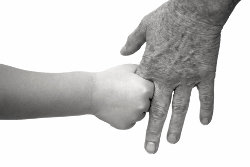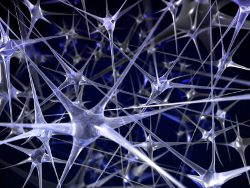A magazine where the digital world meets the real world.
On the web
- Home
- Browse by date
- Browse by topic
- Enter the maze
- Follow our blog
- Follow us on Twitter
- Resources for teachers
- Subscribe
In print
What is cs4fn?
- About us
- Contact us
- Partners
- Privacy and cookies
- Copyright and contributions
- Links to other fun sites
- Complete our questionnaire, give us feedback
Search:
The digital age

Whether you’re young or old (or somewhere in between), computer science can tell you something about faces. Take a look at these stories on faces and age.
A glimpse of the future
Predicting what a person will look like when they’re older is tricky. At the moment it often depends on the imagination of a single person, whether it’s a sketch artist helping to solve a missing person case, or a makeup artist trying to make someone look older. A PhD computer science student in Canada has designed a program to automatically age people’s appearances, by applying rules for how faces change as we get older.
The student, Khoa Luu, actually needed to come up with two sets of rules. In the beginning of our life, when we’re still growing and developing, our faces change their actual structure: they get longer and wider. But once we’ve finished growing, for the rest of our life the changes are all in the soft tissues around the face. Wrinkles appear, and the facial muscles aren’t quite so toned.
Having a set of general rules for how everybody ages is a good start. But a prediction will be more accurate if you can use images from your subject’s family too. It’s a more sophisticated take on the old rule of thumb that says you can tell what someone will look like when they’re older by looking at their parents. So Khoa put together a database of photographs of family members, all from different stages of their lives. It doesn’t even have to take information from your parents. For example, by comparing how your siblings looked years ago with how they look now, the computer program can get clues about how you will look as you get older.
In the future Khoa’s system could help police when searching for a missing person or a fugitive, or it could even help cosmetics companies design anti- ageing products. Computer science is all about the future, but who knew it could predict your future face too?
You'll never forget a face
When you’re young you might wonder what there could possibly be to look forward to at age 30. Boredom and decrepitude? We’ll be honest: maybe. But you can at least count on being at the peak of your ability to recognise faces. Researchers at Harvard and Dartmouth colleges in the USA have found that while most of our mental abilities peak in our early twenties, the ability to recognise and remember faces takes another decade to mature.
The researchers used an internet- based face memory test, completed by 44,000 volunteers. For most of the mental tasks, like remembering names, people around the age of 23 or 24 scored the highest. That is pretty consistent with other findings that show people are generally at their brainy best in their early twenties. Things were different when volunteers got to the face recognition test, in which volunteers tried to recognise and remember a lot of computer- generated faces. There, people’s abilities got much better between 10 and 20 years old, then continued to get better bit-by-bit throughout the next decade. The group who scored highest on this bit of the test were between 30 and 34 years old. After that, scores gradually declined. People who were 65 years old were about as good at recognising faces as 16 year- olds.
Researchers aren’t really sure why face recognition is at its best almost ten years after our other mental abilities. It could be that faces are so complex that our brain needs some extra time to practise. So if you’ve yet to hit the big three-oh, settle in and wait – your best face time is yet to come.

Turn back the clock
Now that you know how computer scientists can make someone look older (see ‘A glimpse of the future’), how about making someone look younger? Turns out psychologists can help us there. Some researchers at Jena University in Germany have found an easy way to make yourself look younger than your years – just hang out with a bunch of older people.
Their experiment hinges on the idea that we average out the faces we see, and judge other faces based on that average. The researchers got a group of people to concentrate on a series of pictures of elderly people on a computer screen. Then, when asked to guess the age of a middle-aged person, the volunteers guessed substantially younger than the person’s real age. The effect was even more pronounced when the volunteers were asked to guess the age of someone of the opposite sex.
For anyone who’s ever wished they looked older rather than younger, there’s good news: this effect goes the other way too. After looking at pictures of younger people, the volunteers thought the middle-aged person looked older than they really were. There’s no way to tell how long the effect lasts, but the researchers helpfully point out that the age of the people next to you has an important effect on the age you’re perceived as. So if you’re a celebrity looking for an entourage the scientific advice is clear: make sure they’re the right age to make you look your best.
The tests the researchers used are all available to try at www.testmybrain.org. You can try tests on your memory, your ability to read emotions, and even whether your taste in beauty is the same as other people! Fun to try, and you’ll be helping science too.


